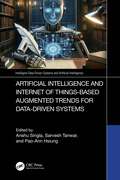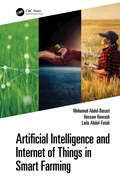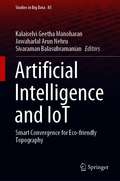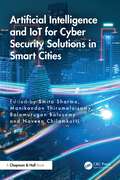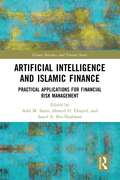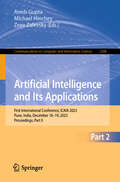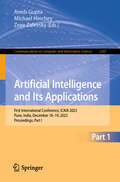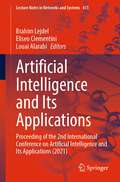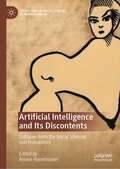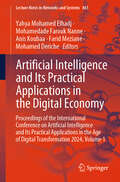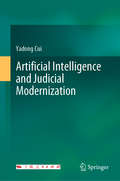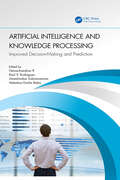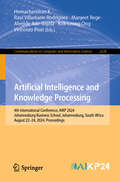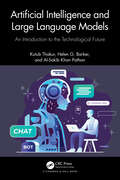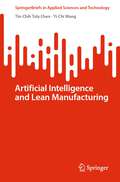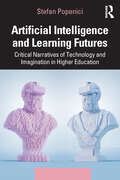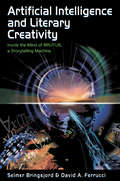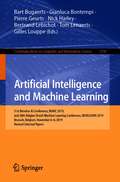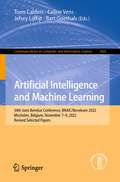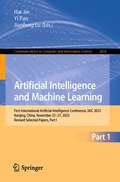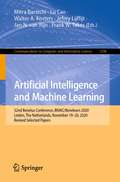- Table View
- List View
Artificial Intelligence and Internet of Things based Augmented Trends for Data Driven Systems (Intelligent Data-Driven Systems and Artificial Intelligence)
by Pao-Ann Hsiung Sarvesh Tanwar Anshu SinglaThis book comprehensively discusses the role of cloud computing in artificial intelligence‑based data‑driven systems and hybrid cloud computing for large data‑driven applications. It further explores new approaches, paradigms, and frameworks to meet societal challenges by providing solutions for critical insights into data. The text provides Internet of Things‑based frameworks and advanced computing techniques to deal with online/virtual systems.This book:• Covers the aspects of security, authentication, and prediction for data‑driven systems in heterogeneous environments.• Provides data‑driven frameworks in combination with the Internet of Things, artificial intelligence, and computing to provide critical insights and decision‑making for real‑time problems.• Showcases deep learning‑based computer vision algorithms for enhanced pattern detection in different domains based on data‑centric approaches.• Examines the role of the Internet of Things and machine learning algorithms for data‑driven systems.• Highlights the applications of data‑driven systems and cloud computing in enhancing network performance.This book is primarily written for senior undergraduates, graduate students, and academic researchers in diverse fields including electrical engineering, electronics and communications engineering, and computer science engineering.
Artificial Intelligence and Internet of Things in Smart Farming
by Mohamed Abdel-Basset Hossam Hawash Laila Abdel-FatahThis book provides a broad overview of the areas of artificial intelligence (AI) that can be used for smart farming applications, through either successful engineering or ground-breaking research. Among them, the highlighted tactics are soil management, water management, crop management, livestock management, harvesting, and the integration of Internet of Things (IoT) in smart farming.Artificial Intelligence and Internet of Things in Smart Farming explores different types of smart framing systems for achieving sustainability goals in the real environment. The authors discuss the benefits of smart harvesting systems over traditional harvesting methods, including decreased labor requirements, increased crop yields, increased probabilities of successful harvests, enhanced visibility into crop health, and lower overall harvest and production costs. It explains and describes big data in terms of its potential five dimensions—volume, velocity, variety, veracity, and valuation—within the framework of smart farming. The authors also discuss the recent IoT technologies, such as fifth-generation networks, blockchain, and digital twining, to improve the sustainability and productivity of smart farming systems. The book identifies numerous issues that call for conceptual innovation and has the potential to progress machine learning (ML), resulting in significant impacts. As an illustration, the authors point out how smart farming offers an intriguing field for interpretable ML. The book then delves into the function of AI techniques, such as AI in accelerating the development of nano-enabled agriculture, thereby facilitating safe-by-design nanomaterials for various consumer products and medical applications.This book is for undergraduate students, graduate students, researchers, and AI engineers who pursue a strong understanding of the practical methods of machine learning in the agriculture domain. Practitioners and stakeholders would be able to follow this book to understand the potential of ML in their farming projects and agricultural solutions.Features:• Explores different types of smart framing systems for achieving sustainability goals in the real environment • Explores ML-based analytics such as generative adversarial networks (GAN), autoencoders, computational imaging, and quantum computing • Examines the development of intelligent machines to provide solutions to real-world problems, emphasizing smart farming applications, which are not modeled or are extremely difficult to model mathematically • Emphasizes methods for better managing crops, soils, water, and livestock, urging investors and businesspeople to occupy the existing vacant market area • Discusses AI-empowered Nanotechnology for smart farming
Artificial Intelligence and IoT: Smart Convergence for Eco-friendly Topography (Studies in Big Data #85)
by Kalaiselvi Geetha Manoharan Jawaharlal Arun Nehru Sivaraman BalasubramanianThis book projects a futuristic scenario that is more existent than they have been at any time earlier. To be conscious of the bursting prospective of IoT, it has to be amalgamated with AI technologies. Predictive and advanced analysis can be made based on the data collected, discovered and analyzed. To achieve all these compatibility, complexity, legal and ethical issues arise due to automation of connected components and gadgets of widespread companies across the globe. While these are a few examples of issues, the authors’ intention in editing this book is to offer concepts of integrating AI with IoT in a precise and clear manner to the research community. In editing this book, the authors’ attempt is to provide novel advances and applications to address the challenge of continually discovering patterns for IoT by covering various aspects of implementing AI techniques to make IoT solutions smarter. The only way to remain pace with this data generated by the IoT and acquire the concealed acquaintance it encloses is to employ AI as the eventual catalyst for IoT. IoT together with AI is more than an inclination or existence; it will develop into a paradigm. It helps those researchers who have an interest in this field to keep insight into different concepts and their importance for applications in real life. This has been done to make the edited book more flexible and to stimulate further interest in topics. All these motivated the authors toward integrating AI in achieving smarter IoT. The authors believe that their effort can make this collection interesting and highly attract the student pursuing pre-research, research and even master in multidisciplinary domain.
Artificial Intelligence and IoT for Cyber Security Solutions in Smart Cities
by Smita Sharma Manikandan Thirumalaisamy Balamurugan Balusamy Naveen ChilamkurtiThis book offers a comprehensive overview of the current state of cybersecurity in smart cities and explores how AI and IoT technologies can be used to address cybersecurity challenges. It discusses the potential of AI for threat detection, risk assessment, and incident response, as well as the use of IoT sensors for real-time monitoring and data analysis in the context of smart cities. It includes case studies from around the world to provide practical insights into the use of AI and IoT technologies for enhancing cybersecurity in different contexts and highlight the potential benefits of these technologies for improving the resilience and security of smart cities.Key Features: Studies the challenges of and offers relevant solutions to using AI and IoT technologies in cybersecurity in smart cities Examines the unique security risks faced by smart cities, including threats to critical infrastructure, data privacy and security, and the potential for large-scale cyber-attacks Offers practical solutions and case studies to be used to inform policy and practice in this rapidly evolving field Discusses the Fourth Industrial Revolution framework and how smart cities have been a significant part of this manufacturing paradigm Reviews aspects of Society 5.0 based on intelligent smart cities and sustainable issues for the cities of the future Postgraduate students and researchers in the departments of Computer Science, working in the areas of IoT and Smart Cities will find this book useful.
Artificial Intelligence and Islamic Finance: Practical Applications for Financial Risk Management (Islamic Business and Finance Series)
by Adel M. SareaThis book provides a systematic overview of the current trends in research relating to the use of artificial intelligence in Islamic financial institutions (IFIs), across all organization of Islamic cooperation (OIC) countries. Artificial Intelligence and Islamic Finance discusses current and potential applications of artificial intelligence (AI) for risk management in Islamic finance. It covers various techniques of risk management, encompassing asset and liability management risk, credit, market, operational, liquidity risk, as well as regulatory and Shariah risk compliance within the financial industry. The authors highlight AI’s ability to combat financial crime such as monitoring trader recklessness, anti-fraud and anti-money laundering, and assert that the capacity of machine learning (ML) to examine large amounts of data allows for greater granular and profound analyses across a variety of Islamic financial products and services. The book concludes with practical limitations around data management policies, transparency, and lack of necessary skill sets within financial institutions. By adopting new methodological approaches steeped in an Islamic economic framework (e.g., analysing FinTech in the context of Shariah principles and Islamic values), it devises practical solutions and generates insightful knowledge, helping readers to understand and explore the role of technological enablers in the Islamic finance industry, such as RegTech and artificial intelligence, in providing better and Shariah-compliant services to customers through digital platforms. The book will attract a wide readership spanning Shariah scholars, academicians, and researchers as well as Islamic financial practitioners and policymakers.
Artificial Intelligence and Its Applications: First International Conference, ICAIA 2023, Pune, India, December 18-19, 2023, Proceedings, Part II (Communications in Computer and Information Science #2308)
by Anish Gupta Michael Hinchey Zeev ZalevskyThis book constitutes the refereed proceedings of the First International Conference on Artificial Intelligence and its Application, ICAIA 2023, held in Pune, India, during December 18–19, 2023. The 37 full papers and 3 short papers presented in these two volumes were carefully reviewed and selected from 217 submissions. The conference focused on three primary domains: Use of AI in Health Care; Machine Vision and Image Processing; Automated and Digital Manufacturing Systems.
Artificial Intelligence and Its Applications: First International Conference, ICAIA 2023, Pune, India, December 18-19, 2023, Proceedings, Part I (Communications in Computer and Information Science #2307)
by Anish Gupta Michael Hinchey Zeev ZalevskyThis book constitutes the refereed proceedings of the First International Conference on Artificial Intelligence and its Applications, ICAIA 2023, held in Pune, India, during December 18–19, 2023. The 37 full papers and 3 short papers presented in these two volumes were carefully reviewed and selected from 217 submissions. The conference focused on three primary domains: Use of AI in Health Care; Machine Vision and Image Processing; Automated and Digital Manufacturing Systems.
Artificial Intelligence and Its Applications: Proceeding of the 2nd International Conference on Artificial Intelligence and Its Applications (2021) (Lecture Notes in Networks and Systems #413)
by Brahim Lejdel Eliseo Clementini Louai AlarabiThis book contains the proceedings of the second edition of the international Conference on Artificial Intelligence and its Applications (AIAP'21). This edition aims to bring together leading academic scientists, international researchers, and practitioners to exchange and share their experiences and research results on all aspects of Artificial Intelligence. It also provides an interdisciplinary platform for researchers, practitioners and students to present and discuss the most recent innovations, trends, and concerns as well as practical challenges encountered and solutions adopted in the fields of Artificial Intelligence. This international conference offers an opportunity to bridge the gap between the Artificial Intelligence research community and people from the industry or working in other research areas including smart cities, big data, cloud computing, social networks, and energy.
Artificial Intelligence and Its Contexts: Security, Business and Governance (Advanced Sciences and Technologies for Security Applications)
by Anna Visvizi Marek BodzianyThis book offers a comprehensive approach to the question of how artificial intelligence (AI) impacts politics, economy, and the society today. In this view, it is quintessential for understanding the complex nature of AI and its role in today’s world. The book has been divided into three parts. Part one is devoted to the question of how AI will be used for security and defense purposes, including combat in war zones. Part two looks at the value added of AI and machine learning for decision-making in the fields of politics and business. Part three consists of case studies—covering the EU, the USA, Saudi Arabia, Portugal, and Poland—that discuss how AI is being used in the realms of politics, security and defense. The discussion in the book opens with the question of the nature of AI, as well as of ethics and the use of AI in combat. Subsequently, the argument covers issues as diverse as the militarization of AI, the use of AI in strategic studies and military strategy design. These topics are followed by an insight into AI and strategic communication (StratCom), including disinformation, as well as into AI and finance. The case-studies included in part 3 of the book offer a captivating overview of how AI is being employed to stimulate growth and development, to promote data- and evidence-driven policy-making, to enable efficient and inclusive digital transformation and other related issues. Written by academics and practitioners in an academically sound, yet approachable manner, this volume queries issues and topics that form the thrust of processes that transform world politics, economics and society. As such, this volume will serve as the primer for students, researchers, lectures and other professionals who seek to understand and engage with the variety of issues AI implicates.
Artificial Intelligence and Its Discontents: Critiques from the Social Sciences and Humanities (Social and Cultural Studies of Robots and AI)
by Ariane HanemaayerOn what basis can we challenge Artificial Intelligence (AI) - its infusion, investment, and implementation across the globe? This book answers this question by drawing on a range of critical approaches from the social sciences and humanities, including posthumanism, ethics and human values, surveillance studies, Black feminism, and other strategies for social and political resistance. The authors analyse timely topics, including bias and language processing, responsibility and machine learning, COVID-19 and AI in health technologies, bio-AI and nanotechnology, digital ethics, AI and the gig economy, representations of AI in literature and culture, and many more. This book is for those who are currently working in the field of AI critique and disruption as well as in AI development and programming. It is also for those who want to learn more about how to doubt, question, challenge, reject, reform and otherwise reprise AI as it been practiced and promoted.
Artificial Intelligence and Its Practical Applications in the Digital Economy: Proceedings of the International Conference on Artificial Intelligence and Its Practical Applications in the Age of Digital Transformation 2024, Volume 1 (Lecture Notes in Networks and Systems #861)
by Yahya Mohamed Elhadj Mohamedade Farouk Nanne Anis Koubaa Farid Meziane Mohamed DericheArtificial Intelligence (AI) technologies hold immense promise for developing countries by offering innovative solutions to longstanding challenges. By leveraging AI in health care, education, economic development, infrastructure, and resource management, these countries can potentially leapfrog traditional development stages and improve the quality of life for their populations. However, it's essential to approach AI deployment with ethical considerations to ensure that the technology serves the best interests of these communities and thus to maximize the expected benefits. The I2COMSAPP'24 "International Conference on Artificial Intelligence and its Applications in the Age of Digital Transformation" aims to provide an excellent opportunity to gather experts, researchers, practitioners, and innovators from various fields to explore the latest advancements, challenges, and practical implementations of artificial intelligence and machine learning (ML) technologies. Moreover, it aims to foster knowledge sharing, collaboration, and networking among professionals who are driving responsible and innovative use of AI and leveraging real-world applications for the betterment of society and industries.
Artificial Intelligence and Its Practical Applications in the Digital Economy: Proceedings of the International Conference on Artificial Intelligence and its Practical Applications in the Age of Digital Transformation 2024, Volume 2 (Lecture Notes in Networks and Systems #862)
by Yahya Mohamed Elhadj Mohamedade Farouk Nanne Anis Koubaa Farid Meziane Mohamed DericheArtificial Intelligence (AI) technologies hold immense promise for developing countries by offering innovative solutions to longstanding challenges. By leveraging AI in health care, education, economic development, infrastructure, and resource management, these countries can potentially leapfrog traditional development stages and improve the quality of life for their populations. However, it's essential to approach AI deployment with ethical considerations to ensure that the technology serves the best interests of these communities and thus to maximize the expected benefits. The I2COMSAPP'24 "International Conference on Artificial Intelligence and its Applications in the Age of Digital Transformation" aims to provide an excellent opportunity to gather experts, researchers, practitioners, and innovators from various fields to explore the latest advancements, challenges, and practical implementations of artificial intelligence and machine learning (ML) technologies. Moreover, it aims to foster knowledge sharing, collaboration, and networking among professionals who are driving responsible and innovative use of AI and leveraging real-world applications for the betterment of society and industries.
Artificial Intelligence and Judicial Modernization
by Yadong CuiThis book comprehensively describes the status quo of artificial intelligence technology applications in the judicial field in China. Written by Cui Yadong, the former President of Shanghai Senior People's Court, it is divided into three parts: the first part focuses mainly on the theoretical issues related to artificial intelligence and judicial applications. The second part highlights practical aspects, discussing the research and development process, the implementation of the"206 system" and the major breakthroughs. The third part then addresses lessons learned and the thinking, particularly the thinking on "building the future rule of law of artificial intelligence", a new topic that responds to people's concerns about the risks and challenges of the development of artificial intelligence. In this context, the book argues that the judicial task is twofold: On the one hand, it should actively promote the integration and application of AI in the judiciary, judicial intelligence, and judicial modernization. On the other hand, it should encourage the construction of a future rule of law system of artificial intelligence, highlight the role of the judiciary in dealing with future risks and challenges, bring the development of artificial intelligence into line with the rule of law, and use the rule of law to promote, standardize and guarantee the safe, reliable and controllable development of artificial intelligence.
Artificial Intelligence and Knowledge Processing: Improved Decision-Making and Prediction
by Hemachandran K Raul V. Rodriguez Umashankar Subramaniam Valentina Emilia BalasArtificial Intelligence and Knowledge Processing play a vital role in various automation industries and their functioning in converting traditional industries to AI-based factories. This book acts as a guide and blends the basics of Artificial Intelligence in various domains, which include Machine Learning, Deep Learning, Artificial Neural Networks, and Expert Systems, and extends their application in all sectors. Artificial Intelligence and Knowledge Processing: Improved Decision-Making and Prediction, discusses the designing of new AI algorithms used to convert general applications to AI-based applications. It highlights different Machine Learning and Deep Learning models for various applications used in healthcare and wellness, agriculture, and automobiles. The book offers an overview of the rapidly growing and developing field of AI applications, along with Knowledge of Engineering, and Business Analytics. Real-time case studies are included across several different fields such as Image Processing, Text Mining, Healthcare, Finance, Digital Marketing, and HR Analytics. The book also introduces a statistical background and probabilistic framework to enhance the understanding of continuous distributions. Topics such as Ensemble Models, Deep Learning Models, Artificial Neural Networks, Expert Systems, and Decision-Based Systems round out the offerings of this book. This multi-contributed book is a valuable source for researchers, academics, technologists, industrialists, practitioners, and all those who wish to explore the applications of AI, Knowledge Processing, Deep Learning, and Machine Learning.
Artificial Intelligence and Knowledge Processing: 4th International Conference, AIKP 2024, Johannesburg Business School, Johannesburg, South Africa, August 22–24, 2024, Proceedings (Communications in Computer and Information Science #2228)
by Hemachandran K. Raul Villamarin Rodriguez Manjeet Rege Abejide Ade-Ibijola Kok-Leong Ong Vincenzo PiuriThis book constitutes the 4th International Conference on Artificial Intelligence and Knowledge Processing, AIKP 2024, held in Johannesburg Business School, Johannesburg, South Africa, during August 22–24, 2024. The 18 full papers included in this book were carefully reviewed and selected from 76 submissions. This AIKP 2024 topics covered in these proceedings; including machine learning; natural language processing; computer vision; robotics; data mining; quantum AI; and cognitive computing.
Artificial Intelligence and Knowledge Processing: Third International Conference, AIKP 2023, Hyderabad, India, October 6–8, 2023, Revised Selected Papers (Communications in Computer and Information Science #2127)
by Vincenzo Piuri Guandong Xu Kok-Leong Ong Hemachandran K Raul Villamarin Rodriguez Manjeet RegeThis book constitutes the Revised Selected Papers of the Third International Conference on Artificial Intelligence and Knowledge Processing, AIKP 2023, held in Hyderabad, India, during October 6–8, 2023. The 20 full papers and 8 short papers were carefully selected from 118 submissions. The research areas include: Artificial Intelligence and Machine Learning; Deep Learning and Computer Vision; Natural Language Processing; Intelligent Control.
Artificial Intelligence and Large Language Models: An Introduction to the Technological Future
by Al-Sakib Khan Pathan Kutub Thakur Helen G. BarkerHaving been catapulted into public discourse in the last few years, this book serves as an in-depth exploration of the ever-evolving domain of artificial intelligence (AI), large language models, and ChatGPT. It provides a meticulous and thorough analysis of AI, ChatGPT technology, and their prospective trajectories given the current trend, in addition to tracing the significant advancements that have materialized over time.Key Features: Discusses the fundamentals of AI for general readers Introduces readers to the ChatGPT chatbot and how it works Covers natural language processing (NLP), the foundational building block of ChatGPT Introduces readers to the deep learning transformer architecture Covers the fundamentals of ChatGPT training for practitioners Illustrated and organized in an accessible manner, this textbook contains particular appeal to students and course convenors at the undergraduate and graduate level, as well as a reference source for general readers.
Artificial Intelligence and Lean Manufacturing (SpringerBriefs in Applied Sciences and Technology)
by Tin-Chih Toly Chen Yi-Chi WangThis book applies artificial intelligence to lean production and shows how to practically combine the advantages of these two disciplines. Lean manufacturing originated in Japan and is a well-known tool for improving manufacturers' competitiveness. Prevalent tools for lean manufacturing include Kanban, Pacemaker, Value Stream Map, 5s, Just-in-Time and Pull Manufacturing. Lean Manufacturing and the Toyota Manufacturing System has been successfully applied to various factories and supply chains around the world. A lean manufacturing system can not only reduce wastes and inventory, but also respond to customer needs more immediately. Artificial intelligence is a subject that has attracted much attention recently. Many researchers and practical developers are working hard to apply artificial intelligence to our daily lives, including in factories. For example, fuzzy rules have been established to optimize machine settings. Bionic algorithms have been proposed to solve production sequencing and scheduling problems. Machine learning technologies are applied to detect possible product quality problems and diagnose the health of a machine. This book will be of interest to production engineers, managers, as well as students and researchers in manufacturing engineering.
Artificial Intelligence and Learning Futures: Critical Narratives of Technology and Imagination in Higher Education
by Stefan PopeniciArtificial Intelligence and Learning Futures: Critical Narratives of Technology and Imagination in Higher Education explores the implications of artificial intelligence’s adoption in higher education and the challenges to building sustainable instead of dystopic schooling. As AI becomes integral to both pedagogy and profitability in today’s colleges and universities, a critical discourse on these systems and algorithms is urgently needed to push back against their potential to enable surveillance, control, and oppression. This book examines the development, risks, and opportunities inherent to AI in education and curriculum design, the problematic ideological assumptions of intelligence and technology, and the evidence base and ethical imagination required to responsibly implement these learning technologies in a way that ensures quality and sustainability. Leaders, administrators, and faculty as well as technologists and designers will find these provocative and accessible ideas profoundly applicable to their research, decision-making, and concerns.
Artificial Intelligence and Legal Analytics: New Tools for Law Practice in the Digital Age
by Kevin D. AshleyThe field of artificial intelligence (AI) and the law is on the cusp of a revolution that began with text analytic programs like IBM's Watson and Debater and the open-source information management architectures on which they are based. Today, new legal applications are beginning to appear and this book - designed to explain computational processes to non-programmers - describes how they will change the practice of law, specifically by connecting computational models of legal reasoning directly with legal text, generating arguments for and against particular outcomes, predicting outcomes and explaining these predictions with reasons that legal professionals will be able to evaluate for themselves. These legal applications will support conceptual legal information retrieval and allow cognitive computing, enabling a collaboration between humans and computers in which each does what it can do best. Anyone interested in how AI is changing the practice of law should read this illuminating work.
Artificial Intelligence and Literary Creativity: Inside the Mind of Brutus, A Storytelling Machine
by Selmer Bringsjord David FerrucciIs human creativity a wall that AI can never scale? Many people are happy to admit that experts in many domains can be matched by either knowledge-based or sub-symbolic systems, but even some AI researchers harbor the hope that when it comes to feats of sheer brilliance, mind over machine is an unalterable fact. In this book, the authors push AI toward a time when machines can autonomously write not just humdrum stories of the sort seen for years in AI, but first-rate fiction thought to be the province of human genius. It reports on five years of effort devoted to building a story generator--the BRUTUS.1 system. This book was written for three general reasons. The first theoretical reason for investing time, money, and talent in the quest for a truly creative machine is to work toward an answer to the question of whether we ourselves are machines. The second theoretical reason is to silence those who believe that logic is forever closed off from the emotional world of creativity. The practical rationale for this endeavor, and the third reason, is that machines able to work alongside humans in arenas calling for creativity will have incalculable worth.
Artificial Intelligence and Machine Learning: 31st Benelux AI Conference, BNAIC 2019, and 28th Belgian-Dutch Machine Learning Conference, BENELEARN 2019, Brussels, Belgium, November 6-8, 2019, Revised Selected Papers (Communications in Computer and Information Science #1196)
by Bart Bogaerts Gianluca Bontempi Pierre Geurts Nick Harley Bertrand Lebichot Tom Lenaerts Gilles LouppeThis book contains a selection of the best papers of the 31st Benelux Conference on Artificial Intelligence, BNAIC 2019, and 28th Belgian Dutch Machine Learning Conference, BENELEARN 2019, held in Brussels, Belgium in November 2019. The 11 papers presented in this volume were carefully reviewed and selected from 50 regular submissions. They address various aspects of artificial intelligence such as natural language processing, agent technology, game theory, problem solving, machine learning, human-agent interaction, AI and education, and data analysis.
Artificial Intelligence and Machine Learning: 34th Joint Benelux Conference, BNAIC/Benelearn 2022, Mechelen, Belgium, November 7–9, 2022, Revised Selected Papers (Communications in Computer and Information Science #1805)
by Toon Calders Celine Vens Jefrey Lijffijt Bart GoethalsThis book contains a selection of the best papers of the 34th Benelux Conference on Artificial Intelligence, BNAIC/ BENELEARN 2022, held in Mechelen, Belgium, in November 2022.The 11 papers presented in this volume were carefully reviewed and selected from 134 regular submissions. They address various aspects of artificial intelligence such as natural language processing, agent technology, game theory, problem solving, machine learning, human-agent interaction, AI and education, and data analysis.
Artificial Intelligence and Machine Learning: First International Artificial Intelligence Conference, IAIC 2023, Nanjing, China, November 25–27, 2023, Revised Selected Papers, Part I (Communications in Computer and Information Science #2058)
by Hai Jin Yi Pan Jianfeng LuThis 3-volume set, CCIS 2058-2060 constitutes the First International Conference, on Artificial Intelligence, IAIC 2023, held in Nanjing, China, in November 2023. The 85 full papers presented were carefully reviewed and selected from 428 submissions. The papers are clustered in parts on: Artificial Intelligence and Machine Learning; Data Security and information Security; Computer Networks and IoT. The papers present recent research and developments in artificial intelligence and its applications in machine learning, natural language processing, computer vision, robotics, and ethical considerations.
Artificial Intelligence and Machine Learning: 32nd Benelux Conference, BNAIC/Benelearn 2020, Leiden, The Netherlands, November 19–20, 2020, Revised Selected Papers (Communications in Computer and Information Science #1398)
by Walter A. Kosters Frank W. Takes Jefrey Lijffijt Mitra Baratchi Lu Cao Jan N. van RijnThis book contains a selection of the best papers of the 32nd Benelux Conference on Artificial Intelligence, BNAIC/Benelearn 2020, held in Leiden, The Netherlands, in November 2020. Due to the COVID-19 pandemic the conference was held online. The 12 papers presented in this volume were carefully reviewed and selected from 41 regular submissions. They address various aspects of artificial intelligence such as natural language processing, agent technology, game theory, problem solving, machine learning, human-agent interaction, AI and education, and data analysis.The chapter 11 is published open access under a CC BY license (Creative Commons Attribution 4.0 International License).
